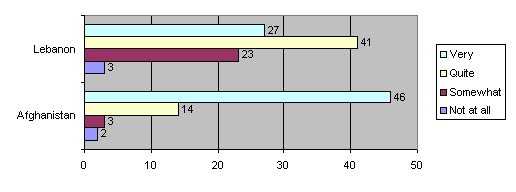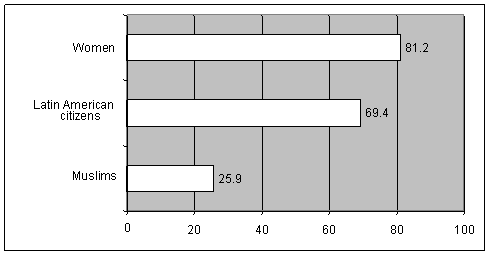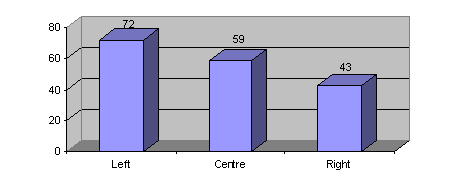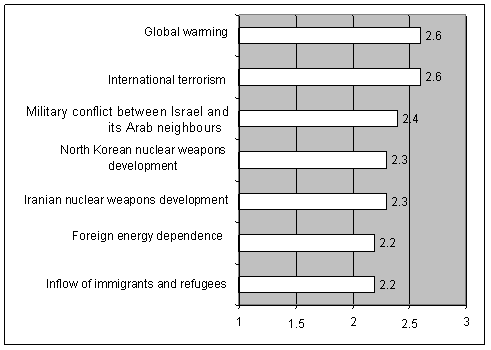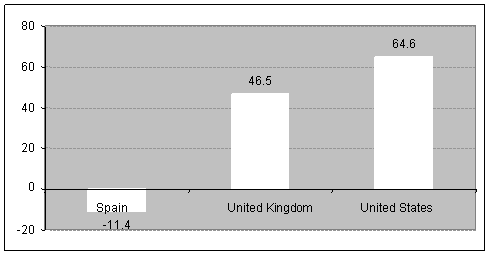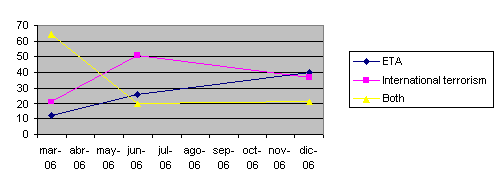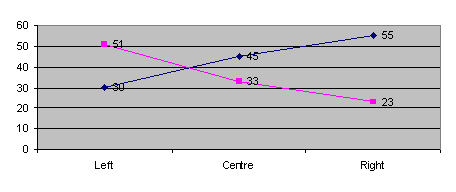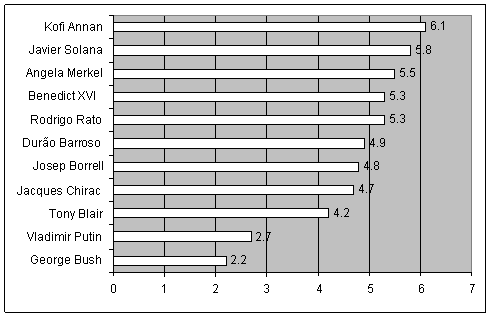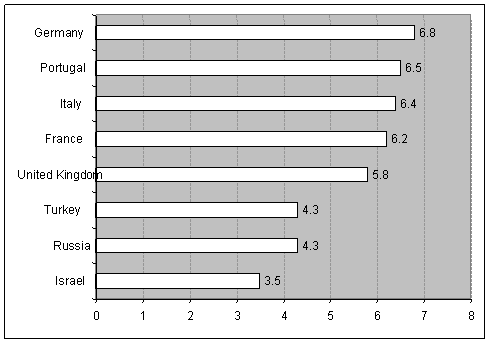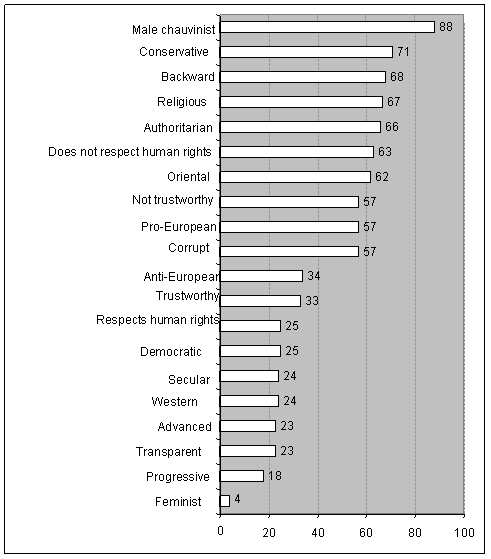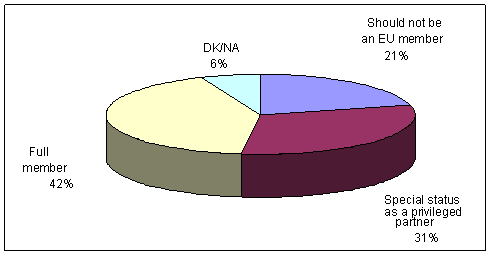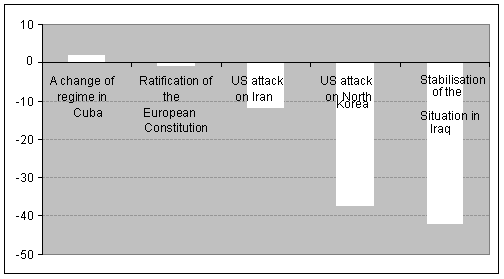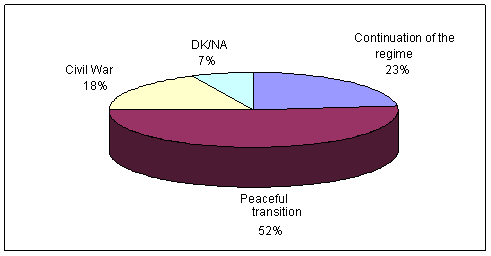THIRTEENTH EDITION OF THE BAROMETER OF THE ELCANO ROYAL INSTITUTE (December 2006)
Press Summary
TECHNICAL DATA
- Universe: Spaniards of both sexes, 18 years of age and older.
- Sample area: National. All Regions (‘Autonomous Communities’) including Ceuta and Melilla.
- Sample size: 1,201 interviews.
- Sample structure: Stratified multi-stage. Proportional, according to the double criteria of size of the population of each Autonomous Community, with proportional quotas according to the age and sex of the population applied at the individual level. The sample error is ±2.9% (1,200n) for global data, p = q = 0.5, with a confidence interval of 95.5%.
- Methodology used: Computer-assisted telephone interview (CATI system); call to home of interviewee.
- Survey period: Field work was carried out between 12 June and 21 June inclusive.
- Field work: TNS – Demoscopia.
SUPPORT FOR SPANISH TROOPS IN LEBANON DESPITE THE DANGER INHERENT IN THE MISSION
- Two out of three Spaniards (60%) support the presence of Spanish troops in Afghanistan. This is similar to their support for troops in Lebanon (63%).
- Despite this, in both cases they believe the missions involve a risk for the troops: more in Afghanistan (80%) and somewhat less in Lebanon (68%).
- As a result, they are against sending more troops. Only 26% would be willing to do so in Afghanistan’s case and 30% in the Lebanon’s.
- Spaniards also agree in both cases regarding their willingness to withdraw troops if there were combat deaths: nearly three quarters of the interviewees believe that the troops should be withdrawn in both cases (73% for Afghanistan and 72% for Lebanon).
- On a related issue, Spaniards give their unreserved support for women joining the Armed Forces. A total of 89% of interviewees affirm this. Also, they are mostly in favour (82%) of letting citizens of Latin American origin join the Armed Forces. Although they are in favour of admitting Muslims, they are less warm to this idea (only 59% in favour, versus 33% who oppose the idea).
Net support for admitting certain groups of persons into the Armed Forces (percentage of interviewees in favour, minus the percentage of interviewees opposed)
- Interviewees with the lowest educational level and socio-economic status are those who are most reluctant to allow practising Muslims to join the Spanish Armed Forces. The same is true of those who identify themselves as right-wing.
% of interviewees in favour of allowing practising Muslims to join the Spanish Armed Forces
FEAR OF ISLAMIST TERRORIST ATTACKS AND GLOBAL WARMING
- Without a doubt, the greater reluctance, not to say rejection, of Muslims in the Armed Forces is the result of the climate generated by Islamist terrorism, which together with global warming is now the greatest concern of Spaniards at the international level. In both cases, 60% of Spaniards consider these to be ‘very significant’ threats.
Among the possible threats mentioned, the planet’s global warming and international terrorism are the two that interviewees consider the most significant, both rating an average of 2.6 on a scale of 1 (not significant) to 3 (extremely significant).
- Although there is believed to be less likelihood of terrorist attacks than in the UK or the US, interviewees believe that they could happen again. In the case of the US, 81% think this is very or quite likely, compared with 16% who consider it quite or very unlikely, and for the UK, 71% think it is likely, versus 25% who think it is unlikely. As for Spain, somewhat more than half of the interviewees (54%) consider it unlikely that an Islamist terrorist attack will happen here again.
Net likelihood of new Islamist terrorist attacks in different countries (percentage who consider such an event very or quite likely, minus the percentage who consider it quite or very unlikely).
- Recent events since ETA announced a ceasefire (street violence, theft of weapons, etc) has meant that since the summer the percentage of those who consider the terrorist organisation to be a threat has risen to the same level as those who feel the same about international terrorism.
- There is clear ideological polarisation in the responses of Spaniards, with perceptions differing radically between people on the right and on the left: the former consider ETA to be the main threat, while for the latter it is international terrorism.
DISTRUST OF THE EAST
- The comments made by Pope Benedict XVI on Islam and violence had neither a positive nor negative effect on his image: he continues to score 5.3 on a scale of 0 to 10, about the same as he received in previous waves of the BRIE. This puts him in the group of highest-ranked leaders, along with Kofi Annan, Javier Solana and Angela Merkel.
- By contrast, Vladimir Putin scored 2.7 out of 10, although President Bush’s 2.2 makes him the lowest-ranked leader.
Ranking of leaders, average on a scale of 0 to 10
- Most Spaniards think that the Russian Federation has an authoritarian government (82%).
- However, half of Spaniards (51%) think it is ‘on the rise’ and that its international weight is increasing, versus 41% who disagree.
- Continuing with Eastern European countries, 60% of Spaniards would support a moratorium on the free movement of Bulgarian and Rumanian citizens after the two countries enter the European Union.
QUALIFIED SUPPORT FOR TURKEY JOINING THE EU
- As a result of the above perceptions, Russia scores 4.3 on a scale of 0 to 10, the same as Turkey, making these the lowest-ranked countries, with the exception of Israel (at 3.5).
Ranking of countries, average on a scale of 0 to 10
- Like Russia, at the political level Turkey is considered a country that is authoritarian (66%), unreliable (57%) and not respectful of human rights (63%); furthermore, in the area of values, it is considered to be male chauvinist (88%) and conservative (71%). By contrast, on the positive side, 57% of Spaniards think that Turkey is pro-European, compared with only 38% who think that Russia is.
- As a result of these considerations, 42% of Spaniards are in favour of Turkey joining the European Union as a full member. 31% would admit Turkey under a special statute as a privileged partner, and 21% are totally against its accession. Therefore, we can say that in Spain, the climate of opinion regarding Turkey is one of qualified support or ambivalence, as a result of an image that is negative in some regards, but not in all.
LIKELIHOOD OF CHANGES IN CUBA IN 2007
- Regarding their expectations for 2007, given the state of Fidel Castro’s health, one out of two Spaniards (47%) expect that there will be changes in Cuba. They consider this more likely than, for instance, a change in the situation in Iraq, the stabilisation of which only 27% of interviewees believe is possible.
Net likelihood of certain events occurring in 2007 (percentage who consider such an event very or quite likely, minus the percentage who consider it quite or very unlikely).
- After the death of Fidel Castro, the interviewees believe it is more likely that there will be a peaceful transition to democracy (52% share this opinion) than a civil war (18% believe this) or simply a continuation of the Communist regime (23%).
Opinions regarding what could happen in Cuba after the death of Fidel Castro



